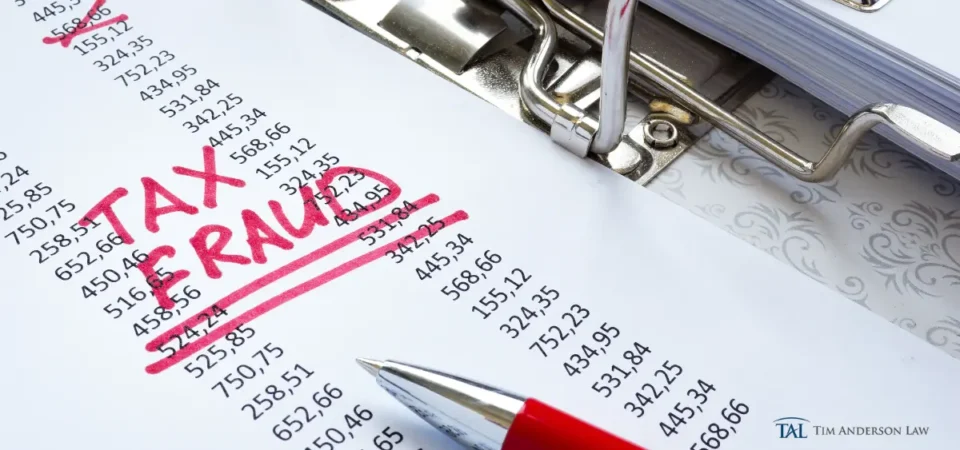A: Yes, you can sue someone for tax fraud if their fraudulent acts directly harmed you. For instance, if someone falsifies a W-2 form and fraudulently reports that you worked for them and received income when you didn’t, you can sue the individual who falsified the W-2 form in civil court for damages. As in any case in which damages are claimed, the plaintiff would need substantial proof to have a successful outcome.
Camden Tax Fraud Lawyer

Camden Tax Fraud Attorney
Tax fraud charges at the state or federal level are serious white-collar offenses and can result in severe penalties. Camden prosecutions for tax fraud can be hard to overcome. If you are charged with tax fraud or a related crime, it is essential that you have an experienced Camden tax fraud lawyer represent you.
Not all tax fraud attorneys are created equal. Tim Anderson Law is a highly experienced and reputable criminal law firm. We have over 30 years of federal white-collar crime experience. Our firm is top-rated in the Camden area. We are noted for our excellence, approach, strategy, creativity, preparation, and client dedication. Schedule a consultation today.
Why Hire a Camden Tax Fraud Lawyer?
In Camden, the prosecution does not go easy on defendants charged with tax fraud. You need a lawyer who can approach your case with a level of defense that matches the level of dedication prosecutors will bring. This should not be taken lightly because penalties for tax fraud at both the state and federal levels are serious.
If convicted, federal tax fraud charges will almost certainly result in a felony. In addition, those found guilty of tax fraud could be fined up to $500K, depending on whether the defendant is an individual or a corporation. Sentencing can include fines and/or up to five years or more of incarceration, as well as court costs.
The United States Sentencing Commission reported in 2023 that New Jersey was in the top five federal districts with the most individual tax fraud sentences, with 14 out of the 363 cases that year. Furthermore, around 64% of those sentenced were sentenced to prison. The average sentencing, nationally, was 16 months. Thus, it is in anyone’s interest who is facing these charges to hire an experienced tax fraud lawyer.
What’s even more eye-opening is that IRS Criminal Investigation had a 91% conviction rate in 2022 for cases involving tax and financial crimes.
At the state level, New Jersey doesn’t go easy on those convicted of tax fraud, either.
What Constitutes Tax Fraud?
According to tax law, statutory code 7201, as included in the Tax Crimes Handbook, the most serious type of tax fraud – tax evasion – involves an individual who willingly evades or avoids paying their taxes by means of deceit, concealment, or camouflage. Avoiding taxes is technically not a criminal offense. It is considered permissible if someone tries to avoid, minimize, or alleviate taxes via legitimate measures. But willingly and intentionally evading taxes is a crime.
There is often a gray area in cases where it is difficult to determine if a defendant is guilty of evasion or just avoidance. A good criminal defense strategy based on this law can sometimes optimize the outcome of a case for a defendant.
The New Jersey Treasury further defines tax fraud with the following examples:
- Falsifying state residency
- Willfully failing to report income
- Failing to file state returns
- Filing a fraudulent return
- Evading taxes by opening and closing a new business
- Failing to turn over tax funds that were collected or withheld
- Overstating expenses or understating income via falsified records
- Crooked tax preparer suspected of breaking criminal NJ tax laws
- Violating the NJ Cigarette Tax Act, such as possessing, selling, or transporting counterfeit tax stamps.
Tax fraud in New Jersey can be reported online if a person can provide the name of the person or business they are reporting, as well as the address, birth date, tax ID, or other identifying information. The person must also report the tax violation they allegedly witnessed, identify the type of violation, such as sales income, etc., and explain how they gained the knowledge and how long it has occurred. Finally, the person must be able to provide asset information.
A person may report tax fraud anonymously. Including their contact information is completely optional.
With over 30 years of experience, Timothy Anderson Law LLC is led by Tim Anderson, a highly accomplished federal criminal defense lawyer specializing in white-collar crimes including tax fraud. His firm offers skilled, compassionate representation focused on achieving the best outcomes for clients facing complex tax fraud investigations and prosecutions under both state and federal law. Contact Timothy Anderson Law LLC today to schedule a consultation.
FAQs
Discuss Your Concerns About Tax Fraud With a Camden Tax Fraud Lawyer
Tax fraud is a serious offense. If you are involved with a case of tax fraud or have been charged with or are under investigation for tax evasion, don’t wait to talk to an experienced attorney. At Tim Anderson Law, our focus is exclusively on criminal law at the state and federal levels. Contact us to discuss your case.

